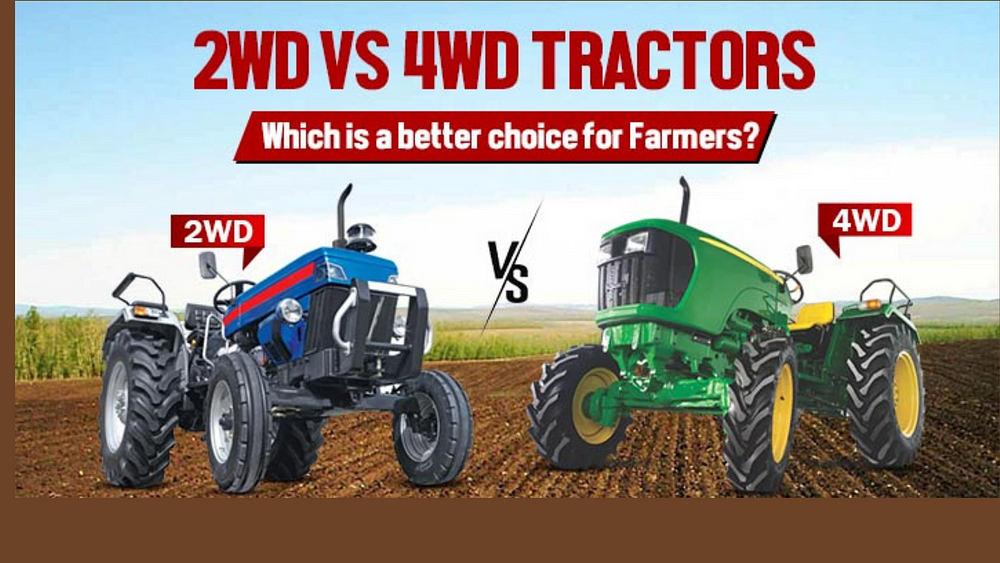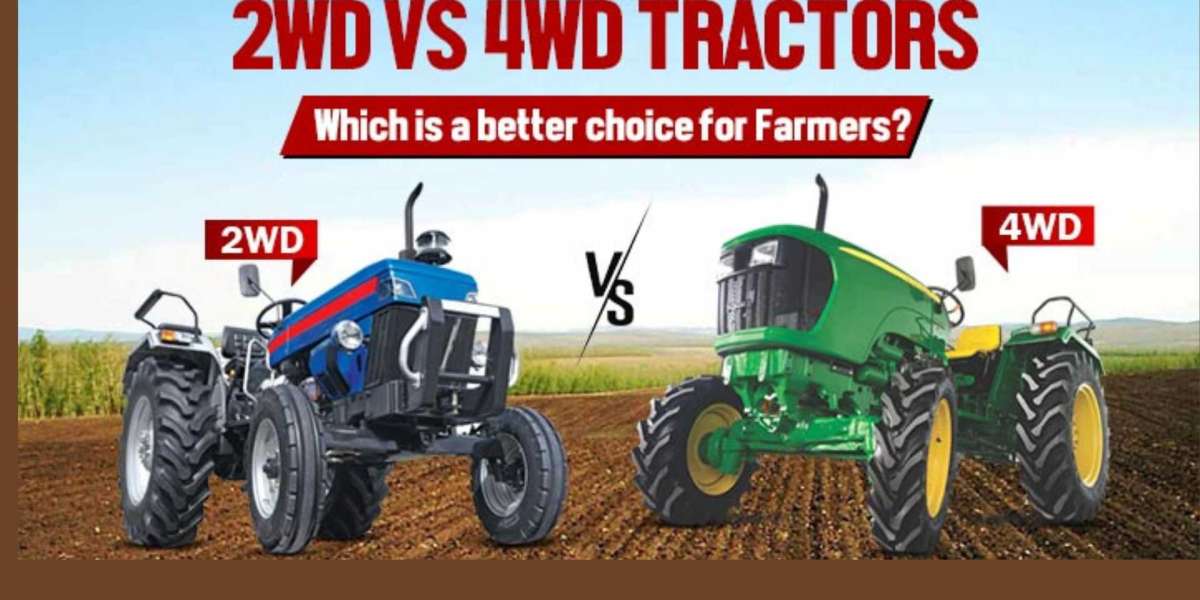When it comes to choosing the right tractor for your farm, one of the key decisions you’ll face is whether to go with a 2-wheel drive (2WD) or a 4-wheel drive (4WD) model. Each type of tractor has its strengths and weaknesses, and the best choice for you depends on factors like your land type, farming needs, and budget.
Let’s break down the differences between 2WD and 4WD tractors to help you make an informed decision.

1. What is a 2WD Tractor?
A 2WD tractor powers only the rear wheels, which push the tractor forward. These tractors are lighter, simpler, and often more affordable than their 4WD counterparts. They are well-suited for smaller farms or areas with flat, dry terrain.
Advantages of 2WD Tractors:
- Cost-Effective: Typically cheaper to buy and maintain due to simpler design and fewer components.
- Better Maneuverability: 2WD tractors tend to have a tighter turning radius, making them ideal for tasks that require precision, like mowing or small-scale tilling.
- Lower Fuel Consumption: Since fewer wheels are engaged, they generally use less fuel than 4WD tractors.
- Lighter Weight: The lighter build of 2WD tractors makes them easier to transport and less likely to cause soil compaction.
Disadvantages of 2WD Tractors:
- Less Traction: They struggle on wet, muddy, or uneven terrain because only the rear wheels provide traction.
- Limited Performance in Heavy Work: Tasks like plowing or hauling heavy loads on challenging ground may be difficult with a 2WD tractor.
- Terrain Limitations: On hilly or rocky land, 2WD tractors may slip or get stuck, reducing their efficiency.
2. What is a 4WD Tractor?
A 4WD tractor powers all four wheels, giving it better traction and stability, especially on tough terrain. These tractors are bulkier and more powerful, ideal for larger farms or areas with challenging conditions.
Advantages of 4WD Tractors:
- Superior Traction: With power to all wheels, 4WD tractors excel in muddy, hilly, or uneven terrain, making them ideal for tough conditions.
- Increased Power: 4WD tractors can handle heavier loads and more demanding tasks like deep plowing, hauling large trailers, or working with heavy implements.
- Better Stability: The even distribution of power to all wheels increases balance, reducing the risk of getting stuck or slipping on challenging surfaces.
- Versatility: Whether it’s snow, mud, or steep inclines, 4WD tractors are designed to handle diverse terrain, making them a better all-weather option.
Disadvantages of 4WD Tractors:
- Higher Cost: 4WD tractors are more expensive to purchase and maintain due to their complex drivetrain and additional components.
- Increased Fuel Consumption: Powering all four wheels requires more energy, so these tractors generally use more fuel.
- Larger Turning Radius: 4WD tractors are usually less nimble than 2WD models, which can be a disadvantage for tasks requiring high maneuverability in tight spaces.
3. When to Choose a 2WD Tractor?
A 2WD tractor is a good choice if:
- You have a smaller farm or mostly work on flat land.
- You primarily perform light tasks like mowing, tilling, or spraying.
- Cost is a significant factor, and you need a budget-friendly solution.
- You work in dry conditions where traction is not a major concern.
4. When to Choose a 4WD Tractor?
A 4WD tractor is the better option if:
- Your land includes hills, mud, or rough terrain that requires extra traction and stability.
- You need a tractor for heavy-duty tasks like plowing, hauling, or using large implements. These heavy duty tractor are beneficial for who are looking for heavy-duty tasks.
- You require a tractor that can perform well in all weather conditions, including rain or snow.
- Your farm is large and you need a machine with greater versatility and power.
5. Cost Considerations
2WD tractors are generally cheaper to purchase, with lower upfront costs and fewer parts to maintain. However, they may not be as efficient for tough jobs, potentially costing you time and productivity. On the other hand, 4WD tractors, while more expensive, often pay off with their increased versatility and ability to handle difficult jobs, leading to better long-term value, especially on larger or more rugged farms.
6. Fuel Efficiency
If fuel costs are a primary concern, 2WD tractors are more fuel-efficient under normal conditions. However, if your farm has tough terrain, a 4WD tractor may ultimately be more efficient as it won’t struggle and slip in mud or on hills, which can waste fuel in a 2WD tractor.
7. Maintenance and Repairs
2WD tractors are easier and cheaper to maintain due to their simpler design. Fewer mechanical components mean fewer things that can go wrong. 4WD tractors, while more powerful, have more parts that require regular maintenance and potential repairs, which can increase long-term costs.
Conclusion: Which Tractor is Right for You?
The choice between a 2WD and 4WD tractor ultimately depends on your specific farming needs, terrain, and budget. If you have a smaller farm on flat, dry land and need a budget-friendly machine for light work, a 2WD tractor may be perfect. However, if your farm has varied terrain, you need more power for heavy-duty tasks, or you want a machine that can handle all weather conditions, a 4WD tractor offers greater versatility and performance.
By considering these factors, you can select the best tractor for your farm and maximize both productivity and cost efficiency.
If You are looking to buy tractors and farm implements visit Tractor Junction Official website.






